Former Finance Minister, Seth Terkper is expressing worry that the 2022 Budget is heavily dependent on debt, rather than innovative ways of collecting revenue and rationalising expenditure.
In his further analysis of the budget which he christened ‘Time to Rebalance the Budget”, Mr. Terkper who is the Director of PFM Tax Africa said the over 40% revenue growth target in 2022 is overly ambitious and shows that quite a significant amount of the expenditure will come from loans.
According to Mr. Tekper, the expected increase in revenue is hiding the fiscal effect of high expenditures which is the main driver of the fiscal deficit, borrowing and unsustainable debt.
“The increase in revenue, of nearly half of prior year’s budget and provisional actuals seems very ambitious. It hides the fiscal effect of high expenditure – the main driver of the deficit, borrowing and unsustainable debt”.
He expressed worry that the Electronic Transaction Levy (E-Levy) has relegated the discussions of more pressing issues such as unsustainable deficit, borrowing and public debt, saying the e-levy is only one of the many fiscal challenges.
The 2022 fiscal deficit is estimated at ¢37.5 billion including the International Monetary Fund Special Drawing Rights, and therefore the former Finance Minister claims the e-levy cannot solve the nation’s financial predicament.
“2022 will be the 3rd year or more running that, despite this ambitious revenue target, total revenue does not cover compensation and interest”, he added.
Continuing, he said the time to pass the 2022 Budget, by December 31, 2021 is fast approaching and therefore Cabinet and Parliament must work expeditiously on a strategy for revenue, expenditure, borrowing and real sector initiatives.
“As stalemate in Parliament on economic policy continues, clock is ticking on detailed consideration of the estimates and policies of sector ministries—poses major fiscal risk on non-passage of budget and closure of government for lack of authority to disburse Consolidate Fund inflows.”
He also suggested a conversation targeted at reforms, austerity and restructuring—to focused on single revenue and expenditure items.











